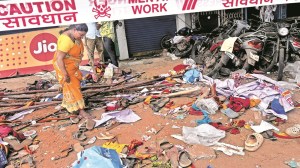Bringing smile, stethoscope to the African wild west
FREETOWN, JULY 3: So where is the toilet?'' When an aide pointed towards a hole in the ground in one corner of the tent, Major (Dr) Durga ...

FREETOWN, JULY 3: So where is the toilet?” When an aide pointed towards a hole in the ground in one corner of the tent, Major (Dr) Durga Jayaraman could not believe it. A radiologist posted in Pune, it was on Christmas eve that she along with Major (Dr) Pratima Singh landed at the Lungi International Airport in Sierra Leone.
Six months later, the women are at home here. But not alone. Along with them are Captains Madhu Malti, Susan Namchu, Geeta Panja, Meeta Roychoudhary and Savitri Mathur — the nursing officers. They are roughing it out, but not complaining.
In fact, Captain Savitri and Meeta have been here since August ’99. There was nothing here that time. “The soldiers who landed from India in the evening, cut waist-high wild grass, pitched their own tents and warned us about snakes in the grass,” says Major Singh. “That time we were scared. Not of rebels or gunfighting but of snakes and frogs and mice. In fact before going to toilet (that hole in the ground) we used to flash the torch around and see in the light that there was no snake curled behind the bucket,” she adds. Though Major Singh was used to it after her stint as a doctor in the Jaisalmer desert sector, it was a first-time experience for the others.
Going to west Africa, it was unbelievable at first. “There was a coup in Ivory Coast where we were supposed to land. Our flight was held up because we could not go there and for several hours we were in the aircraft. Finally we got to Sierra Leone,” Dr Singh recalls. “There were no beds and not even mattresses. It was extremely hot. Initially between all of them they had only four plates so they took turns to eat. When we got our first mattress, bed and fan, we celebrated. And after that there was so much work that there was little time to think of anything else,” says Major Jayaraman.
The doctors have been treating soldiers from Ghana, Nigeria, India and several other countries forming a part of the United Nations Mission in Sierra Leone. “Gunshot injuries, stomach aches, viral fever, everything. There is one Intensive care unit (ICU) and two wards,” she adds. With 11,000-men-strong UNAMSIL, there is work at all times.
How are they managing to stay away from their families and children for so long? “It is extremely tough for us. We are army officers but we are also mothers. My daughter passed her class X board examination in flying colours and missed me there,” she says.
During times like these, families also forget the time difference between the two continents. She got a call at three in the morning and rushed to the phone wondering whether there was an emergency. “My daughter just could not wait and as soon as it was morning in Kirki (Pune), she called.”
They are also a source of strength and inspiration for the younger soldiers. “There are times that the new lot gets disheartened so many miles away from home in totally unfamiliar surroundings, we tell them how bravely the lady officers are doing it and coax them to go along,” says an officer.
Captain Savitri has been in Freetown since August 1999 without a break. “Her example is actually an inspiration for the others too,” says an officer. The doctors are also very sought after by the local people and have never said no. Locals are friends but their biggest ally is the computer. The hospital has a computer wit an Internet connection and through e-mail they stay in touch with their families at all times. “The moment we get to a computer and there’s a mail from home we say yahoo!,” they say.





- 01
- 02
- 03
- 04
- 05


























